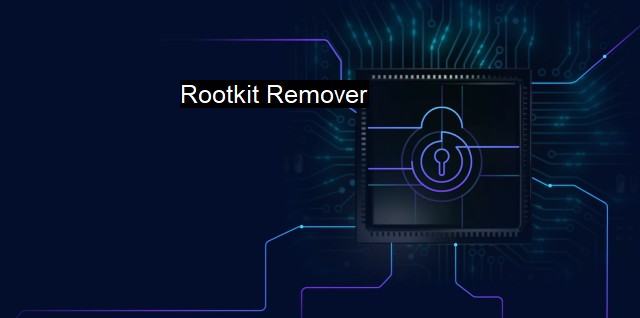What is Rootkit Remover?
Combating Sophisticated Cyber Threats with Rootkit Removers: Advanced Solutions to Safeguard Computer Systems
A rootkit remover is a specialized cybersecurity software tool that is designed to detect and eliminate rootkits from a computer system. Rootkits are a type of malicious software, or malware, that hide their existence and activities from users and other system processes. They can reside in various parts of a computer system, such as the kernel, the application, or the hardware level, and can enable unauthorized users to gain control over the system without being detected by the system's security surveillance.The term "rootkit" originates from Unix and Linux operating systems where "root" represents the highest level of system access, equivalent to an administrator account in Windows. A hacker equipped with a rootkit can act as a system administrator with full access privileges. Thus, the danger posed by rootkits is not merely from the malicious capabilities that they possess but also from the significant security breaches they can facilitate by allowing unauthorized access to your system.
The major challenge associated with rootkits lies in their incredible stealthiness and sophistication. Some rootkits exploit system vulnerabilities to modify and replace critical system files, which makes them extremely difficult to detect by traditional antivirus applications. They can intercept and manipulate system functions to hide processes and files, create hidden user accounts, and open backdoors, among other mischievous actions.
That’s where rootkit remover comes in. A rootkit remover is devised to specifically recognize the unique features and behaviour associated with rootkits, which escapes the purview of regular antivirus programs. As soon as the rootkit remover identifies these malicious components, it aims to remove them without causing any damage to the normal system processes and files.
A comprehensive cybersecurity strategy must include a rootkit remover since these sophisticated threats form a distinct category separate from conventional viruses or other malware. Not all antivirus products have the capability to effectively deal with rootkits which makes having a separate rootkit remover a necessary investment. Modern rootkit removers employ a variety of strategies to detect and eliminate rootkits, such as signature-based detection, behaviour-based detection, heuristic analysis, and virtualization.
Let’s say a few words on how a rootkit remover typically works. To start, the software performs a deep scan of the system, including commonly overlooked places where rootkits tend to hide. It then cross-references the results with known rootkit signatures and behaviour patterns present in its registry. An alert is raised if the software encounters suspicious activities that match those signatures and patterns.
In case a rootkit is detected, the rootkit remover then attempts to disable and remove it. since rootkits are expertly designed to resist removal and can get deeply embedded in the system, there may be variants that won’t be eliminated by certain software. In such scenarios, the safest course of action can be to back up vital information, format the entire system, and reinstall software from trusted sources, although this is regarded as the last resort.
Summing up, a rootkit remover fills a significant void that might be present in our routine cybersecurity management systems. Rootkits persist as one of today's most pressing cybersecurity threats, with their ability to not just wreak havoc on our systems but also facilitate unauthorized access to sensitive data. Rootkit removers serve as a crucial line of defence against these stealthy villains, ensuring our systems are safe, secure, and function as intended; hence, making them indispensable allies in today's ever-evolving cyber threat landscape.

Rootkit Remover FAQs
What is a rootkit remover?
A rootkit remover is a software tool designed to detect, identify, and remove rootkits from a computer system. A rootkit is a type of malicious software that is specifically designed to hide its presence or other activities from detection by antivirus and other security programs. Rootkit removal tools are essential for IT professionals and home users looking to protect their systems from advanced cyber threats.How does a rootkit remover work?
Rootkit removal tools work by scanning a system's memory, hard drive, and registry for any signs of suspicious activity or malicious code. Once a rootkit is detected, the remover uses a combination of signature-based and behavioral-based methods to identify and remove the threat from the system. Some rootkit removers also include advanced features like real-time protection and system analysis tools to prevent future infections.What are the benefits of using a rootkit remover?
There are several benefits to using a rootkit remover, including: 1. Improved system performance and stability 2. Enhanced protection against advanced cyber threats 3. Reduced risk of data theft, loss, and corruption 4. Increased confidence and peace of mind when using your computer 5. Better overall system security and resilience.How can I choose the right rootkit remover?
Choosing the right rootkit remover depends on several factors, including your specific needs, the level of protection required, and your budget. When selecting a remover, look for features like real-time protection, automatic updates, system analysis, and a user-friendly interface. Additionally, consider reading reviews and ratings from other users to get an idea of the effectiveness and reliability of the software. Always opt for a trusted and reputable provider to ensure the best possible protection for your system.| | A | | | B | | | C | | | D | | | E | | | F | | | G | | | H | | | I | | | J | | | K | | | L | | | M | |
| | N | | | O | | | P | | | Q | | | R | | | S | | | T | | | U | | | V | | | W | | | X | | | Y | | | Z | |
| | 1 | | | 2 | | | 3 | | | 4 | | | 7 | | | 8 | | |||||||